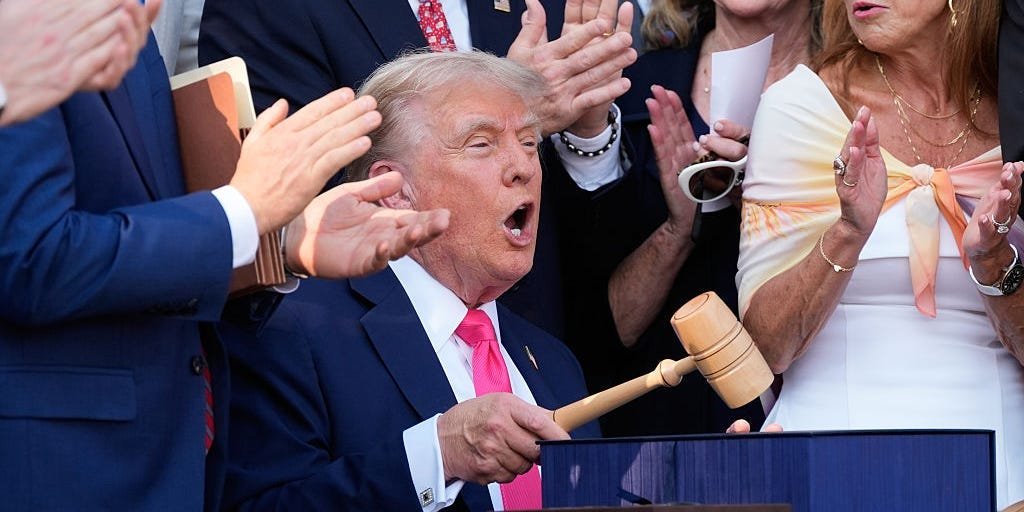President Donald Trump’s “big beautiful” spending plan will make major changes to Medicaid, the nation’s largest health insurance program. It means millions of children and low-income Americans could lose that support — or states will have to make up the difference.
Signed into law on July 4, Trump’s budget outlines about $1 trillion in federal spending reductions to Medicaid over the next decade. Alongside new requirements that non-exempt recipients work 80 hours a month in order to qualify for insurance, the “Big Beautiful Bill” restricts how much money states can funnel from provider taxes toward Medicaid and limits some federal hospital spending, especially in rural areas. In practice, this could mean hospitals lose funding, and some Medicaid recipients could experience higher out-of-pocket costs.
In a statement to BI, White House spokesperson Kush Desai said the president has made a “clear pledge” while in office, vowing not to cut Medicaid, Medicare, or Social Security. Desai said Trump’s spending plan “only addresses waste, fraud, and abuse to protect and preserve Medicaid for the Americans who rely on the program by implementing commonsense reforms like popular work requirements and income eligibility verification.”
An analysis from health research and news platform KFF using Congressional Budget Office estimates found the reduction in federal spending for Medicaid over 2025 to 2034 could range from 6% in Alabama and Wyoming to 21% in Louisiana and Virginia. Most states could have percent drops in the double digits.
While the analysis doesn’t include how many people could be affected by these spending changes, government data shows about 1.4 million people in Louisiana and about 1.6 million in Virginia were enrolled in Medicaid this March. Reductions in federal healthcare spending could impact those not enrolled in Medicaid by disrupting funding that some local hospitals need to stay operational, KFF also reported.
You can hover over the map to see the estimates of spending reductions in each state, per KFF.
KFF’s analysis had some limitations. KFF said CBO’s estimates were based on an earlier version of the bill; changes were made in the final version that passed Congress late last week. KFF used previous estimates and made adjustments based on some changes made. KFF also didn’t examine the effects of a $50 billion program funding grants to states for rural healthcare added to the bill “and did not account for other changes to the legislative language that were more complicated,” such as “applying new restrictions on provider taxes to local government taxes in expansion states.”
What Trump’s spending bill means for children, low-income Americans, states, and rural hospitals
As of March, nearly 79 million people received coverage under Medicaid or the Children’s Health Insurance Program. The insurance can cover doctor appointments, hospital visits, long-term care, prescription drugs, and lab testing. Eligibility varies across the country; recipients need to have an income near the poverty line to qualify in most states.
A Business Insider analysis of 2023 Census Bureau data compiled by the University of Minnesota found that a plurality of Medicaid recipients were white, and adults on Medicaid were less likely than the general population to have a college degree and more likely to be out of the labor force — potentially due to caregiving responsibilities or disabilities. Children make up about 40% of those enrolled in Medicaid despite being just around a fifth of the population. And, while separate 2024 data showed California and New Mexico had the highest rates of Medicaid enrollment, at least 10% of residents in most states were recipients.
It’s not clear if Trump’s spending plan will directly impact the amount of money recipients get from Medicaid each year. However, the changes in program eligibility and overall spending could mean that some recipients lose partial or full access to insurance. States may also have to foot more of the bill for Medicaid as federal funding shrinks.
“The Medicaid reconciliation provisions are numerous and complicated, but the majority of federal savings stem from work requirements for the expansion group, limiting states’ ability to raise the state share of Medicaid revenues through provider taxes, increasing barriers to enrolling in and renewing Medicaid coverage, and restricting state-directed payments to hospitals, nursing facilities, and other providers,” the KFF report said.
The Center for American Progress also said “states will have to reevaluate their budgets to either supplement the spending or cut services” going forward because Medicaid eligibility changes will likely mean more uninsured people and restrict states’ ability to fund their healthcare programs.
Advocates for the new spending plan have said that these changes will prevent fraud and curb spending. In a July 4 X post, Health Secretary Robert F. Kennedy Jr. wrote, “Thank you, @POTUS and Congress for delivering One, Big, Beautiful Bill in time for America’s birthday. It will cut waste, fraud, and abuse in Medicaid and deliver better care to the most vulnerable Americans.”
Have a tip or story to share? Reach out to these reporters at allisonkelly@businessinsider.com and mhoff@businessinsider.com or via Signal at alliekelly.10 and madisonhoff.06. Here’s our guide to sharing information securely.
Read the full article here

















